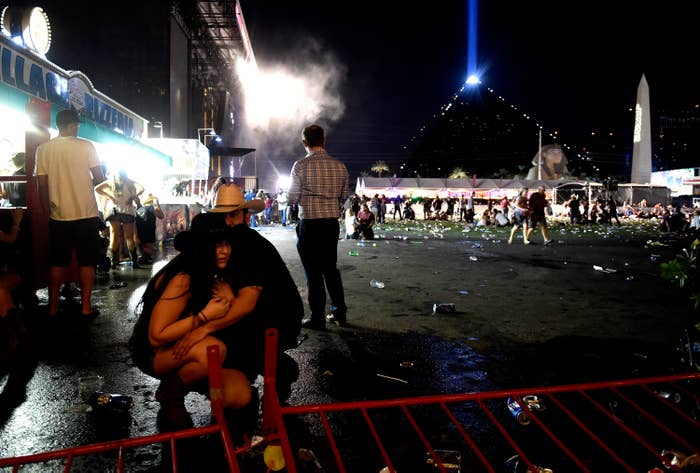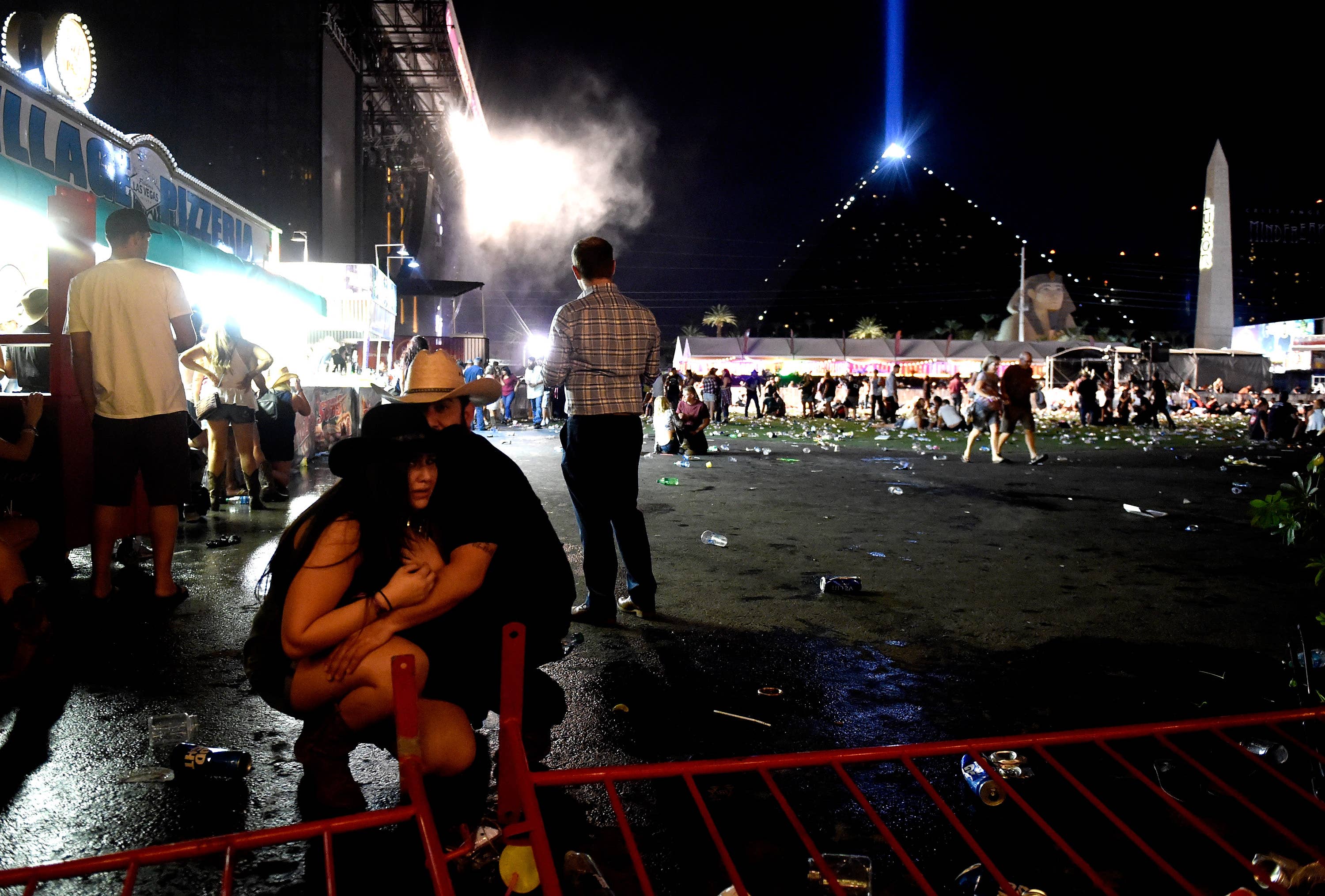
Waking up and rolling over to check our phones this morning, one notification jumped off the screen: A gunman killed over 50 people and injured at least 400 during a Sunday night concert in Las Vegas. Instantly, shock and sadness swept over the nation.
Confirmed as the deadliest mass shooting in modern U.S. history, we’re all grasping to understand one thing: Why? Why did this happen? Right now, we don’t know. And that question, frankly, may never have an answer. But we do know this: It’s just another day in the United States, where over 270 mass shootings have taken place in 2017 alone.
That means, on any given day in the United States this year, there’s been about a 75 percent chance of a mass shooting taking place. In 2015, there were 355 mass shootings in the year's first 336 days. That’s the country we’re living in right now—where you can go out, live, work, and love, but still know that there’s a strong chance you’ll see another day where fellow Americans are senselessly gunned down.
America has decided that open firing on children at school with military-grade weaponry is bearable.
Mass shootings and gun violence have become a normal part of life in the United States, even when we've vowed to end it all in the past. In December 2012, 20 elementary school children between the ages of six and seven were gunned down at Sandy Hook Elementary School in Newton, Connecticut. Small children were horrifyingly murdered in cold blood with a semi-automatic rifle. We cried with families who lost young sons and daughters. And as a nation, we demanded action from Congress by way of gun control legislation.
But nothing has come to fruition. Not a single gun control law has passed Congress since the Sandy Hook shooting. Let's not mince words here: America has decided that open firing on children at school with military-grade weaponry is bearable. We're completely unwilling to think critically about the role of guns in civilized society. Apparently, thoughts and prayers are enough. Actionable change from Congress—like common sense gun restrictions (no civilian needs an assault weapon, full-stop), universal background checks, or gun buyback programs—is evidently just too much to ask for.
Even right after the Sandy Hook massacre, the best Congress could come up with was a modest, bipartisan bill to require criminal and mental background checks for gun sales at shows and online. But the National Rifle Association (NRA) opposed the bill, asking for Congress to focus on our “failing” mental health system to prevent mass shooters from becoming mass shooters instead. Stunningly, they overlooked a simple fact—that the bill they opposed would’ve kept guns out of the hands of those same potential mass shooters struggling with mental health problems.
Thanks to a single NRA press release, the bill was defeated. In its wake, 100 more attempts at federal gun control legislation since Sandy Hook have also failed. In effect, Congress has made its own peace with near-daily mass shootings.
How is that possible though? The answer itself rests within the true swamps of American politics. Essentially, a Republican-controlled Congress is more loyal to the NRA and its political and financial support than it is to the people. Senator Chris Murphy, who represents the families of Sandy Hook victims, made that clear this morning while commenting on the Las Vegas shooting:
“It is positively infuriating that my colleagues in Congress are so afraid of the gun industry that they pretend there aren’t public policy responses to this epidemic There are, and the thoughts and prayers of politicians are cruelly hollow if they are paired with continued legislative indifference. It’s time for Congress to get off its ass and do something.”
Despite the tragedy in Las Vegas, we shouldn’t expect Congress to get off its ass. Not when this Congress was the most expensive to elect in NRA history. During the 2016 election cycle, the NRA spent more than $50 million backing Republican candidates—more than any other outside group—and won every race except for one.
And in 2014, they spent over $30 million to help Republicans win back the Senate. The NRA has spent millions during each election cycle this century to get their anti-gun control candidate elected, and in large part, they’ve been successful each time.
Guns are a matter of politics, not life and death, and that’s the real issue here.
The results have been deadly. Since Sandy Hook, there have been over 1,300 mass shootings in the U.S. Americans are 20 times more likely to die from gun violence than people in other developed countries. The U.S. represents 4.4 percent of the world’s population, but owns a disproportionate half of its civilian-owned guns. And—this shouldn’t come as a surprise—but states with more guns have more gun deaths. The fact that guns are instruments of death first and foremost—and not just symbols of constitutional protections—seems to be lost on us.
We’ve allowed ourselves to politicize guns instead of having honest conversations about them. It hasn’t helped that the NRA has heavily pushed its “good guy with a gun” myth, and that they’ve turned the government’s oversight of guns into a red or blue issue. According to Social Science Quarterly, there’s a 30 percent difference between gun-owners and non-gun owners when it comes to the likelihood of voting for a Republican. Guns are a matter of politics, not life and death, and that’s the real issue here.
But when guns are viewed as weapons, and not political tools, actionable change through politics is possible. We have the capacity to address mass shootings and gun violence. How Australia dealt with guns after the Port Arthur Massacre is the best example of this. In 1996, a mass shooting in Australia killed 35 people. With a heavy conscience undisturbed by a powerful gun lobby, the country enforced stricter gun control laws, and rolled out a nationwide gun buyback program, which collected over 600,000 firearms. Since then, Australia hasn't had a single mass shooting.
The United States is more than capable of changing its current gun culture to save lives. But that means standing up to the NRA, Congress, and our deadly commitment to a literal interpretation of the second amendment. It’ll take a swell of courage, but putting innocent lives over conflated idealism is what the U.S. needs to do.

